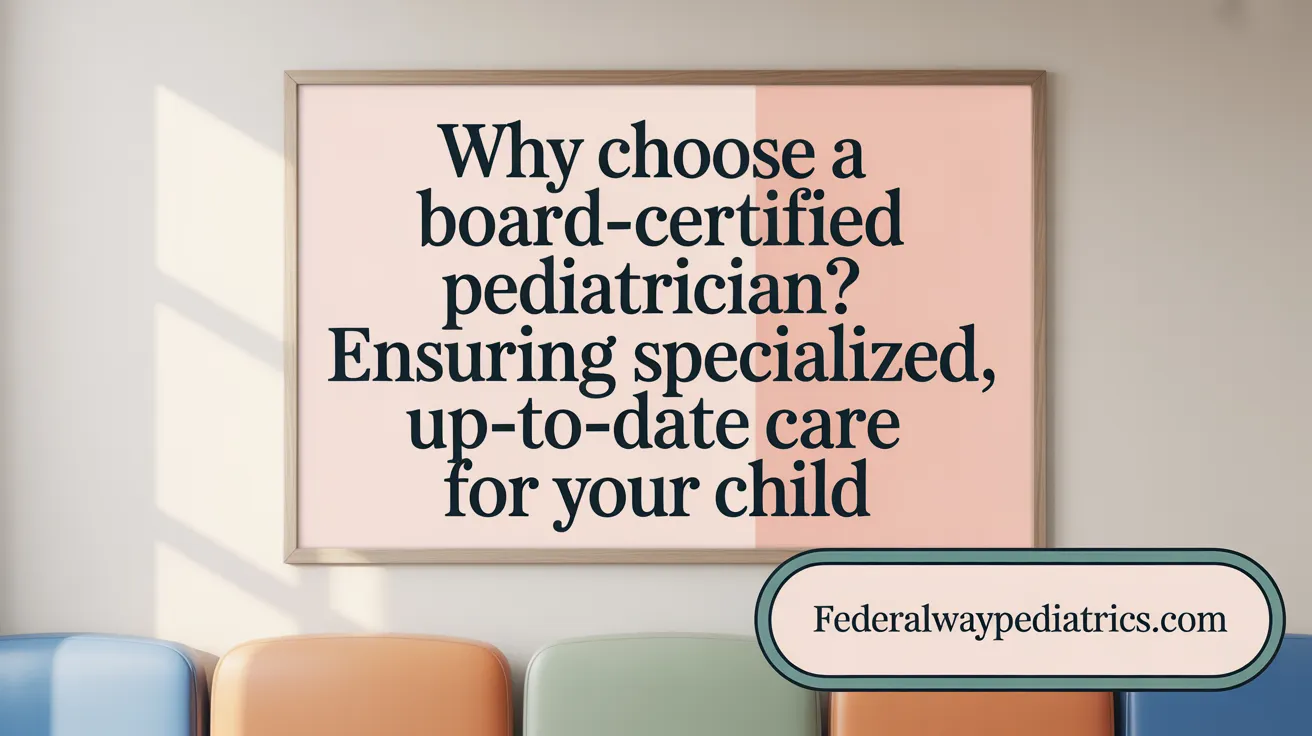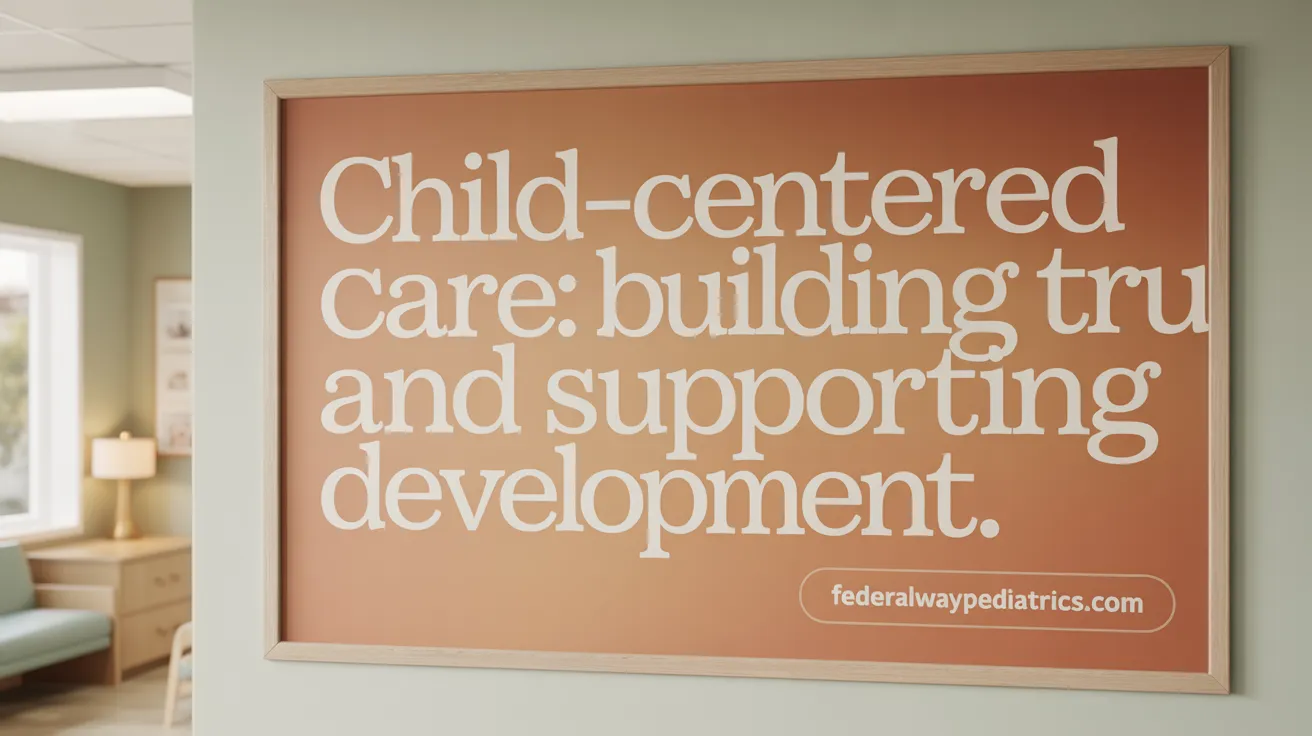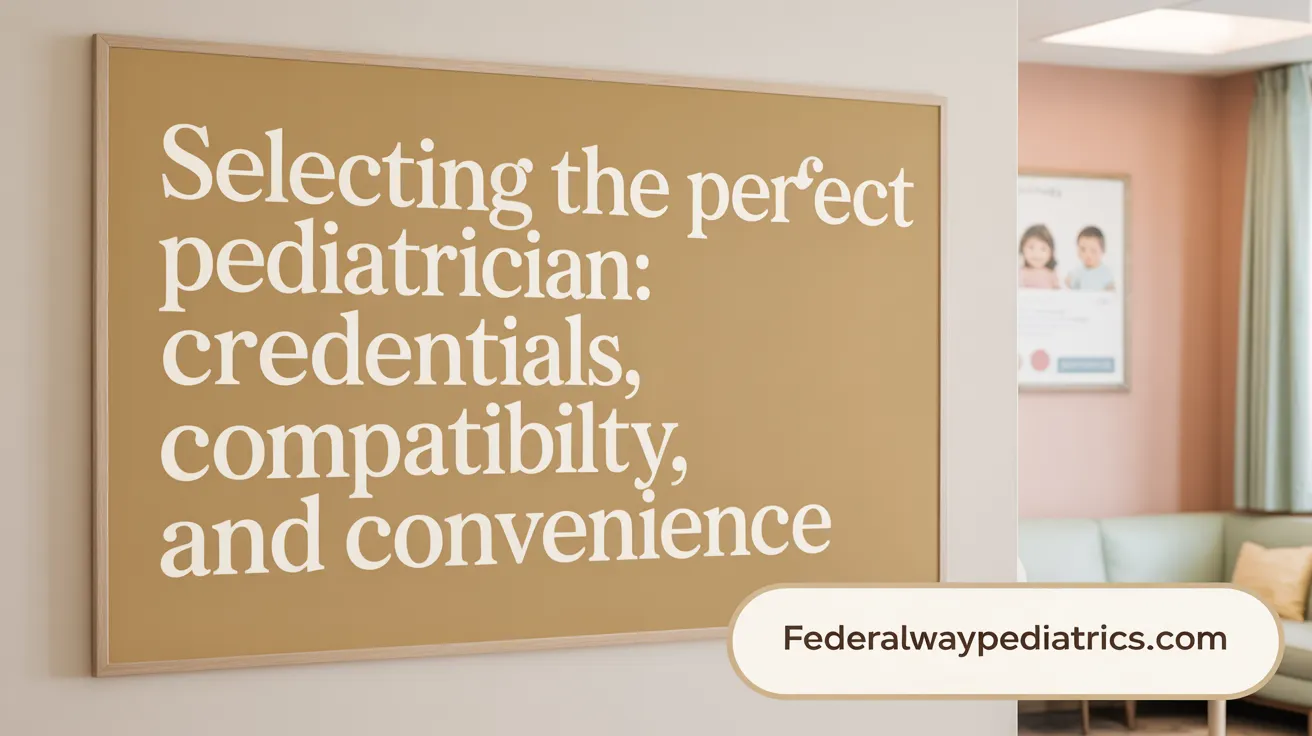Understanding the Importance of Pediatric Expertise
Choosing the right pediatrician is a critical decision for parents seeking the best healthcare for their children. A board-certified pediatrician offers specialized knowledge, rigorous training, and ongoing professional development that ensures high-quality, up-to-date care tailored to the unique health needs of children and adolescents. This article explores the benefits of selecting a board-certified pediatrician and how this choice supports your child's health and wellness throughout their development.
What Does Board Certification Mean for Pediatric Care?

What is board certification for pediatricians?
Board certification for pediatricians is a voluntary, rigorous process awarded by the American Board of Pediatrics (ABP). It signifies that a pediatrician has completed a medical degree, a dedicated three-year residency in pediatrics, and has passed comprehensive specialty exams. This certification reflects advanced knowledge and skills specific to children's health beyond the basic state medical license.
How does board certification differ from state medical licensing?
State medical licensing permits a physician to legally practice medicine but does not indicate specialty expertise. In contrast, board certification shows that the pediatrician has met elevated standards through specialized training and examination. It confirms a pediatrician’s proficiency in managing childhood diseases, developmental milestones, and unique health needs.
What are the training and examination standards for pediatricians?
Pediatricians must graduate from an accredited medical school, successfully complete a rigorous three-year pediatric residency, and pass the ABP certifying exam. This exam assesses in-depth knowledge of pediatric medical conditions, patient care, communication, professionalism, and systems-based practice.
What does ongoing education and recertification involve?
Board-certified pediatricians participate in the Maintenance of Certification (MOC) program, requiring continuing medical education, performance improvement activities, and passing a recertification exam every ten years. This ensures their skills and knowledge remain current with evolving pediatric medicine.
This certification process guarantees families that their child's pediatrician adheres to high standards, stays updated on the latest medical advances, and commits to delivering quality, comprehensive care tailored to children from birth through adolescence.
Advantages of Choosing a Board-Certified Pediatrician for Your Child’s Health

What are the benefits of choosing a board-certified pediatrician?
Board-certified pediatricians bring specialized knowledge about childhood diseases, symptoms, and developmental milestones, ensuring their care is tailored specifically to children's unique health needs. They undergo rigorous training including a medical degree, a three-year pediatric residency, and must pass a comprehensive examination to obtain initial board certification. To remain certified, they engage in ongoing education and pass recertification exams every ten years.
This commitment guarantees parents that their child is receiving care based on the most current medical guidelines and treatment methods. Additionally, these pediatricians are part of the American Board of Pediatrics (ABP) network, which offers access to a wide range of pediatric subspecialists and the latest research findings. This collaboration fosters comprehensive and coordinated care, especially for children with complex or specialized health needs.
How does board certification ensure quality care?
Board certification ensures pediatricians meet high standards across several competencies including medical knowledge, patient care, communication skills, professionalism, and practice improvement. They participate in the ABP’s Maintenance of Certification (MOC) program, a continuous process involving education, exams, and practice assessment. This ongoing learning cycle helps pediatricians stay current with the latest advances in pediatric medicine and healthcare delivery.
Through this process, board-certified pediatricians demonstrate a commitment to quality improvement and patient safety. The certification also reassures families that the pediatrician adheres to professional and ethical standards, maintaining the highest level of care over time. By choosing a board-certified pediatrician, parents invest in reliable, expert care that supports their child’s health and development comprehensively.
The Role of Pediatricians in Comprehensive, Child-Centered Care

Pediatrician expertise in growth, development, and chronic conditions
Pediatricians specialized in child health specialize in caring for children's health from birth through adolescence. Their focused training equips them to monitor child growth and development monitoring milestones closely, manage chronic conditions such as asthma and diabetes, and recognize illnesses that often present differently in children compared to adults. This expertise ensures that children receive care tailored to their unique physical and emotional needs throughout their development.
Importance of continuous, personalized care and strong doctor-parent relationships
A strong, ongoing relationship between a pediatrician and family is crucial for effective healthcare. It allows the pediatrician to understand the child's medical history and growth patterns more deeply, leading to early detection of health issues and personalized treatment plans. This pediatrician-patient relationship fosters trust and reduces anxiety for both children and parents, enhancing overall wellness and supporting importance of long-lasting pediatrician relationships and long-term health outcomes.
Pediatric clinics’ child-friendly environment and communication skills
Pediatricians specialized in child health are skilled at interacting with children at various developmental stages, helping young patients feel comfortable and engaged during visits. Their clinics often feature welcoming, child-friendly settings with bright colors, toys, and activities designed to ease children's fears. Additionally, pediatricians prioritize communication skills in pediatrics with both children and families, providing guidance on preventive care, healthy lifestyles, and addressing parental concerns in a supportive manner.
Why is ongoing relationship with a pediatrician important for a child?
A sustained relationship enables the pediatrician to closely track and understand the child's growth, health needs, and development over time. This familiarity allows for personalized care from pediatricians that can prevent, detect, and manage health concerns early. It also builds trust, making children less anxious during visits and encouraging open communication.
How do pediatricians support children and families beyond illness treatment?
Beyond treating illnesses, pediatricians focus on preventive care, development monitoring, and family education. They provide vaccinations, screen for developmental delays, and advise on nutrition and behavior. Pediatricians create a nurturing environment that supports both physical and emotional health, often serving as a trusted source of guidance for parents.
Choosing the Right Board-Certified Pediatrician for Your Family

What should parents consider when selecting a pediatrician?
Parents should look for board-certified pediatricians and have relevant experience or subspecialty training that matches their child’s health needs. Convenience matters — office location, office hours, and whether the practice accepts the family’s insurance plan are key practical points. Hospital affiliations are also important to ensure smooth referrals and access to specialists if needed. Beyond logistics, assessing the pediatrician’s communication style and whether their values align with the family’s beliefs about health and wellness helps build trust and improve ongoing care. For more on choosing a pediatrician, including pediatrician expertise and certification, visit this helpful resource.
How can parents verify if a pediatrician is board-certified?
Verifying a pediatrician’s certification can be done through trusted resources like the American Board of Pediatrics (ABP) and the American Academy of Pediatrics (AAP). The AAP’s “Find a Pediatrician” tool lists board-certified pediatricians verified for their credentials. Additionally, asking family, friends, neighbors, or other healthcare providers for personal recommendations can direct parents to reputable, certified pediatricians. For details about the pediatrician board certification process, including certification exams and ongoing education, see this comprehensive explanation.
Why is interviewing prospective pediatricians important?
Meeting with potential pediatricians gives parents a chance to ask questions about office policies, availability, emergency procedures, and vaccination philosophies. It also allows them to assess the doctor’s bedside manner, approach to child and family care, and overall compatibility. Touring the office and meeting the staff can help parents decide if it’s a welcoming, child-friendly environment. This step ensures parents feel comfortable and confident with their choice, ultimately benefiting their child’s health and well-being. Learn more about how to choose a pediatrician near you and the importance of building trust in the pediatrician-patient relationship from trusted sources.
Long-Term Benefits of Board-Certified Pediatric Care for Children

How does care from a board-certified pediatrician impact long-term child health?
Board-certified pediatricians possess specialized training that equips them to recognize early signs of illness and developmental issues unique to children. This early detection allows for prompt and effective interventions, which can prevent complications and support healthier growth trajectories. They play a vital role in preventive care by administering immunizations and offering guidance on nutrition, physical activity, and other lifestyle factors to reduce the risk of chronic conditions later in life.
A continuous relationship with a familiar pediatrician helps track a child’s growth and development over time. This consistent monitoring ensures tailored care that adapts as children grow, leading to improved outcomes throughout childhood and adolescence.
In what ways do board-certified pediatricians contribute to advancing pediatric care?
Board-certified pediatricians are part of professional networks that foster collaboration, research, and the sharing of knowledge across the pediatric community. They actively participate in quality improvement initiatives and ongoing education, ensuring their practices reflect the latest scientific evidence and clinical guidelines.
Their involvement in pediatric research contributes to the development of new treatments and care standards. By engaging in these activities, board-certified pediatricians help elevate national healthcare quality, ensuring that children benefit from advanced and effective medical care.
These combined efforts by certified pediatricians not only enhance individual child health but also drive progress in pediatric medicine as a whole.
Choosing Excellence in Pediatric Healthcare
Selecting a board-certified pediatrician is one of the most essential decisions parents can make for their child's health and development. This choice ensures access to expertly trained physicians dedicated to continuous learning, quality improvement, and comprehensive child-centered care. With specialized knowledge, up-to-date medical practices, and a commitment to building lasting relationships, board-certified pediatricians provide a foundation for healthier childhoods and brighter futures. Trusting your child's healthcare to a board-certified pediatrician brings peace of mind and the assurance of superior care tailored specifically for your child’s unique needs.
